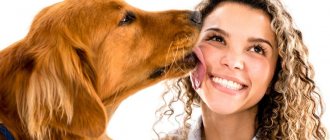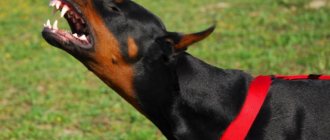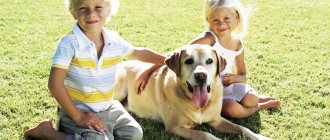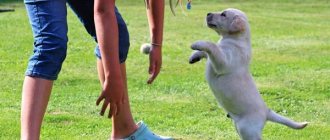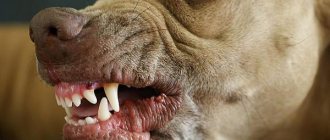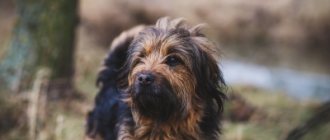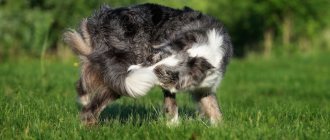If you want to get a puppy, then you should know how a dog chooses its owner in the family.
Dogs have long lived with humans as pets. There are many theories explaining the reason for the appearance of these animals in the house. The most common of them is that a person tamed a wolf, and thereby acquired protection and a friend, and the beast received shelter, food and care.
Did you know that there are breeds of dogs that will not listen to another owner ? These are the 5 most beautiful and unique breeds.
Now it is difficult to imagine the modern world without dogs. Some people are afraid of them, but most treat them with love and respect. When purchasing a dog, it is important to immediately set priorities and let the animal understand who is boss in the house and who should be obeyed. How do dogs choose their owner? How to make your pet choose you as its owner? You will find answers to these and other questions in this article. Read on.
Do dogs choose their owner?
The dog and its owners
The dog's closest relative is the wolf. Animals live in packs, and if for the wolf its relatives become its members, then the dog builds a hierarchy of relationships in the family. Initially, the animal may try to win its place as the boss, but over time it recognizes the strength of the person. The dog really chooses its owner.
There cannot be more than one leader in a pack, so the dog considers as such the family member who initially took the leading position. At the same time, other people living in the house are assigned certain roles. The animal walks with one, the other feeds it, etc. It is worth understanding that even if a dog is friendly with all the residents of the house, it will only obey the one it recognizes as the leader.
Eating food
Food for this animal is not just a source of energy needed to restore strength / Photo: businessman.ru
Food for this animal is not just a source of energy needed to restore strength. If we talk about the alpha male, then it is he who gets the largest pieces, since he controls the pack and is responsible for its safety, which means he spends a lot of effort and energy. Often the dog is guided by this parameter.
It doesn’t matter who prepares the food, what matters is who is first and in what quantities eats it. If they feed first, then this person expends more effort than others. If the whole family is worried about the state of the stomach of one person, then this is the leader, the head.
At what age does a puppy choose an owner in the family?
A dog in adolescence chooses its owner in the family.
The first months of a dog’s life are the most important period of socialization. She begins to understand the world and her surroundings. Therefore, it is very important at this age to instill in the pet all the necessary attitudes. At what age does a puppy choose an owner in the family?
- It is important to understand that the negative experience of communication, if there was one, will remain with the dog for the rest of its life. For example, a person who offends an animal while it was a puppy will always be its enemy.
- A very small puppy does not understand which person is in charge. That's why he reaches out to everyone.
- During adolescence - about 5 months, the dog can determine the leader.
A person who spends a lot of time with an animal, plays, fairly punishes, trains and treats deserves respect. No less important for the pet is how the owner behaves with other family members.
Motivation
To become an owner, you don’t need to give him food uncontrollably; the dog must have motivation / Photo: severdv.ru
The dog's whole world is focused on the home and family in which he lives. Therefore, its livelihood is completely dependent on people. To become the owner, you do not need to give him food uncontrollably. The dog must have motivation. Certain requirements must be set that will be unconditionally observed.
Why does a dog choose one owner?
A dog chooses one owner
A dog chooses a leader not only based on the person’s attitude towards it. In a dog’s understanding, members of a pack (family) are divided into several main niches:
- Alpha . The most important member of the pack, making all decisions and responsible for the offspring.
- Beta. Members of the pack subordinate to the leader, replacing him if necessary.
- Gamma. Young family members, these include children and the animal itself.
- Omega . Elderly family members who need to be protected.
Why does a dog choose one owner? Answer:
- Because pack animals have instincts that there should be only one leader.
- The owner of the dog, as the head of the pack, must fully perform the dominant functions: protect, feed, treat and instruct its members.
- Also, his solutions are always unrivaled. Under no circumstances should you belittle authority or raise your voice at the head of the family in the presence of a dog, especially in puppyhood.
As a dog grows up, it may try to become an alpha. In a flock, gamma individuals claim to be the leader. Young animals cope better with the responsibilities of a leader, because it is easier for them to get food and protect their flock.
Love and respect
It is important for a dog to show not only care, but also respect for it as an individual / Photo: latterdaysaintmag.com
For every dog without exception, it is very important to satisfy his basic instincts. He can implement most of them himself. But as for friendship and especially love, it’s completely different. It's about showing not only care for the dog, but also respect for it as an individual.
If a wife feeds, washes, prepares a bed for a four-legged family member, but at the moment of sound sleep she keeps waking him up, and her husband once told him to leave him alone and let him rest, this can play a decisive role. In the eyes of the dog, the man becomes the leader.
How does a dog choose its owner in the family?
A dog and its owner are alike
Everyone knows that a pet chooses its owner in the family at the level of instinct. But how does this happen in dogs?
- You can often see photographs of pets that look remarkably like their owners. And this is quite understandable. In addition to authority, it is important for a dog to have the same energy as its owner.
- An aggressive animal will be closer to an active and strong-willed person, an easy-going dog is more likely to prefer a homebody.
- Under no circumstances should you prove your role to your pet using force. You need to take care of the dog, protect it from dangers, and over time it will begin to protect you.
Joyful tail wagging and licking from head to toe does not mean that the dog considers you to be the leader. This is how these animals express their positive emotions.
Strength and intelligence
The first few walks with the owner for both the dog and the person become decisive in their future relationship / Photo: sobakevi4.ru
The first few walks with the owner for both the dog and the person become decisive in their future relationship. The dog is trying to make its own route. If a person follows his lead, then he will not become a leader. It is the person who must be stronger and smarter, if necessary, adjust the route, hold the leash in the right position, guide, not allow tugging and behave as he pleases. When walking, the owner should lead the dog, and not vice versa.
How to determine and understand who the dog has chosen as the owner in the family?
The dog looks into the owner's eyes
Every family member should take care of the dog. An animal can be friendly with everyone. But how to determine and understand who the dog has chosen as the owner in the family? There are several signs that mean that the pet has chosen a specific person as its owner:
- Eye contact. A dog looks straight into the eyes of someone it respects.
- Co-sleeping. Not necessarily in the same bed, the animal can simply be located nearby.
- Chain yawn . The dog yawns after its owner.
- Toy separation . The pet brings the owner's favorite toys.
- Tactile contact. Dog "kisses", the animal often places its muzzle on the owner's lap.
- Obedience . The leader's commands are always followed.
A dog can fawn on one and bring objects to another. But it is the totality of all the signs that shows whom the animal has chosen as its owner.
There is a simple test to determine which family member a dog considers to be in charge. The dog is seated, the people claiming to be the owner, disperse from it at the same distance, and begin to call at the same time. The animal will run up to the one it considers the leader.
Never hit your pet
Often, owners try to re-educate their disobedient pet by resorting to physical punishment. The dog handler explained to me that this is absolutely unacceptable. Beating has never led to correction of behavior, but only generates aggressive behavior in the dog.
Nowadays, almost all dog handlers have abandoned the use of force when correcting dog behavior. There are more humane ways of training that help your pet become more socialized and balanced.
What should you do to make a dog choose you as its owner?
The dog has chosen its owner.
The one who will take on all the functions of an exemplary “parent” can become a leader for a dog:
- Will take care
- Develop
- Treat
- Walk
- Be in love
But sometimes you want your pet to choose you as a leader.
Important: At some point, the pet may try to regain leadership; this must be stopped immediately. But, in no case through physical force. It is forbidden to hit a dog, no matter what it does.
The dog has chosen its owner.
What should you do to make the dog choose you as its owner and recognize you as the boss? Here are the tips:
- Go to places unknown to your pet. The leader through unknown territory is the leader.
- Don't show your fear to the animal . Dogs are acutely aware of uncertainty or fear, and a true leader cannot have these qualities.
- Don't let your pet look down on you . Leaders are always larger than the rest of the pack; you should not let her run up the stairs in front of you, as this will make you seem smaller than you really are.
- Follow through . When demanding the execution of a command, do not retreat, because the leader always seeks obedience.
- Play tug of war . The dog will feel that you are stronger than him without showing aggression.
- Don't let your dog become aggressive towards you directly . The animal may get angry and bite the towel you use to dry it or the nail clipper, but not you.
- Be sure to educate and train your dog. You show her your intelligence and experience.
- Stop unwanted behavior . Use soft methods of pressure: a reproachful look or menacing intonations.
- Don't punish your dog for no reason . An alpha is always fair and cannot take out evil on an animal just like that.
- Don't delay approval and blame . Immediately praise for a good deed and punish for disobedience.
- Don't chase the dog . The leader can catch up with a member of the pack only to punish.
Only a person who is confident in his abilities can become a leader. Treat your dog with love, but do not forget about severity, then the animal will recognize you as the leader.
How to avoid mistakes in parenting
Of course, your pet needs love, care, affection and attention. But everything is good in moderation: the dog is unlikely to take seriously and obey someone who allows him to do whatever he wants. Moreover, the dog may try to take the place of leader in the family. This usually manifests itself in aggressive behavior when trying to take away his food bowl or toy. In particularly difficult cases, a dog may try to drive a person away from the territory it considers its own or bark loudly at him during a walk. In such advanced cases, it is necessary to involve specialists in correcting behavior.
Before getting a dog, all family members should discuss their roles within the team and the general model of behavior.
The attitude towards animals should be strict, but fair: hitting a pet is strictly prohibited
In order for the dog to feel comfortable and calm in the family and not try to take a dominant position, the following rules must be followed:
- the dog must have its own sleeping place; it must not be allowed to sleep in the same bed with a person;
- attempts to jump on people and furniture must be stopped;
- the animal must know and follow basic commands: “Sit”, “Place”, “No”, “Come to me”;
- The dog should not beg, beg or receive food from the table.
At the same time, in no case should obedience on the part of the animal be achieved by force and rudeness. Cruel treatment does not have the best effect on the psyche of a pet, which, instead of affection and respect, will experience fear and anger, and once suppressed aggression can lead to an attack on the owner.
Video: how to raise an ideal dog and become a real owner for it
The dog chose another owner: what to do, can this happen?
The dog has chosen another owner.
You bought a puppy, but he does not recognize you as the leader. The dog chose another owner. What to do, can this happen?
- Most likely this happens because you are not the leader in the family.
- Dogs are often bought for children, but the animal treats them as equals, and it is almost impossible to change this.
- Alpha is always the strongest and bravest; all family members obey and respect him.
- Therefore, demanding recognition from an animal is useless.
- Do not forget that dogs, like all animals, live by instinct, feeling the leader and obeying him.
A situation is possible when the dog recognizes you as the leader, but after some time another family member becomes the leader for it. This can happen for several reasons:
- You have seriously offended the animal . For example, they hit you or left for several days. The leader never leaves his pack and does not allow himself to show aggression towards its members.
- Your authority was belittled in front of the dog . For example, they raised their voice at you in her presence or swung at you. Such an attitude towards a leader is unacceptable.
- You are not taking care of the dog. Training, feeding, treatment, walks are your direct responsibilities towards the animal. Having shifted worries to another family member, do not be surprised if the dog recognizes him as the leader.
In general, these animals are very loyal creatures. A change of owner is stressful for them, so having chosen one leader, the animal ceases to consider him as such in very rare cases. But if you offend your dog, you risk not only losing its respect, but also becoming an enemy for life.
Large flock, one leader
The leader must earn the love, affection and obedience of a dog. Usually the animal considers the leader to be the person who is nearby during difficult moments in life - for example, during vaccinations and treatment. Any dog needs to be trained if you want to get a smart and obedient animal. Your chances of becoming a leader for your dog also increase:
- feeding;
- walks and games;
- training in basic commands;
- protection from hazards;
- strict and fair attitude.
Animals are always very sensitive to the atmosphere in the family. And she is unlikely to choose as her owner a person who feeds her, but at the same time constantly pampers her.
My dogs have completely different temperaments, their characters fully correspond to the characteristics of the breeds. Bernese Mountain Dog Alba is a herding dog, large, good-natured and non-aggressive, but very cunning. She feels very subtly when a person is giving in, she understands with whom in the family she can behave as she pleases, and this behavior will remain without consequences. Gertrude is a Jagdterrier, a hunting dog from “working” parents, small, agile, aggressive and distrustful, and at the same time completely unsophisticated. When she goes into a frenzy, she sees and hears nothing around her, ignoring almost everything except her goal. At the same time, both dogs obey me unquestioningly, just as they allow themselves to ignore the commands of other family members. Moreover, they subtly pick up the intonations in my voice, the strict tone instantly stops any of their games, activities and pampering. Teaching commands and training is something that only I have done with dogs since puppyhood. At the same time, they are fed by a completely different person, whom they do not obey at all, and my maximum is a treat as a reward for obedience and following the command.
Very often, a dog considers the leader to be the person who is nearby during difficult and significant moments in his life.
One of the surest ways to become a “leader” for your dog is to explore unfamiliar places with him. A person leading the exploration of new territories is automatically perceived by the animal as a leader. In addition, raising a dog should be consistent: if the animal is forbidden, for example, to climb onto the sofa, but this rule must be strictly followed, and not according to the mood of the owner, and any rebellion on the part of the dog must be suppressed in the bud. The same rule applies to other everyday things - trimming nails, washing paws after a walk, cleaning ears, bathing.
The animal should not be allowed to show aggression towards others and especially towards members of the household, and the owner himself should not show aggression towards the dog either. This applies primarily to panic and screaming: dogs react very sensitively to the owner’s tone and intonation and changes in his mood. But this does not mean that you cannot raise your voice at a dog, you just need to do it calmly, strictly, confidently and only to the point.
How does a stray dog choose an owner and does he choose?
A stray dog has chosen an owner.
Dogs become homeless from birth and because of unscrupulous owners. In the first case, making friends with an animal and taming it will be quite simple. In the second, it is worth taking into account the circumstances due to which the dog ended up on the street. If the previous owner beat the animal and abused it, then faith in people will be greatly shaken. And it is very difficult to restore this trust, but it is possible with affection, care, love.
How does a stray dog choose an owner and does he choose? When an animal from the street gets into a family, it chooses a leader according to the same principles as a teenage puppy who was raised from an early age. The person who is respected, has a strong-willed character and is obeyed in the family, will be the owner for the dog. You will see this by the puppy dog eyes that look at you and the unquestioning execution of commands.
It is also worth considering:
- It happens that the previous owner of the dog died, and the pet ended up on the street.
- In this case, get ready for the animal to feel sad.
- After all, everyone knows about dog loyalty.
- There is no need to be offended or jealous, give your pet time and surround it with care and attention, over time the dog will definitely appreciate it.
Stray dogs are more difficult to train to live with a family than purebred dogs. It will take a lot of patience, time and effort. It is better to take very small puppies, they are much easier to raise.
Important: A dog picked up on the street has difficulty getting used to life in the house, but once it gets used to it, it becomes the most devoted friend forever.
It is not without reason that a dog is believed to be man’s best friend. It is difficult to find a more sociable and devoted pet. You can get a dog if you are confident in your abilities. Get ready for certain difficulties: attempts to gain authority, aggression, damaged furniture. But after going through all the difficulties and taming the animal, you will gain a faithful friend who will never betray or leave. Good luck!
Favorite place
If there is a chair in the house in which the same person always sits, then the dog regards him as a leader / Photo: wallpapersgood.ru
The dog notices all the details and observes the behavior of people. For example, if someone in the house has their favorite chair, which others prefer not to sit on, even if it is not at home, then this is the “leader”, the head of the family, and therefore the owner.
The positive associations are huge.
Why do we give dogs treats when we train them? Thus, they have a positive association with the following teams. Obey the command, get a treat.
Every time they like something, they form a positive association with the person who gave them what they liked. Your dog's loved one may simply offer something that no one else does or can.
Why you shouldn't look for someone to blame
Lydia Ushakova notes that, having learned about such features of dog psychology, owners often begin to blame themselves. However, you should not assume that the owner is to blame if he cannot cope with his own anxiety.
We all have the right to be afraid and look for different ways to cope with our fears. This is often a long and difficult process. “I am for people to talk about this and ask for support. Anxiety is not something you can turn off. And therefore, the help and support of the owners is of particular importance to me,” emphasizes Lidiya Ushakova.
Dogs cannot tell what is happening to them, and therefore it is not always easy for us to understand each other. But trying to deal with our own fears and anxieties can bring us closer to understanding what our four-legged friend is experiencing. None of us are perfect, we make mistakes.
The dog does not want to intentionally upset the owner; often it is simply difficult for him to cope with stress. Just like us, people, too.
Physical and emotional withdrawal from the dog
The main rule for a dog that is overly attached is to achieve some distance from it.
Under no circumstances should you let him lie on the bed, on the sofa, or take part in a family dinner. The dog should not receive any undeserved affection, no matter how much he asks for it and tries to attract attention. In most cases, it is enough just to show indifference: you don’t need to look at the dog, talk to it, or pet it
You can drive the dog away or send it to its place.
This first and main condition for dealing with the over-attachment of a pet, despite its apparent simplicity, usually turns out to be the most difficult to fulfill.
After all, most people do not want to give up a tender relationship with their pet and continue to throw treats to him while eating and take him on their lap while watching TV. Not paying attention to a dog that asks for affection, and moreover, driving it away: what a nightmare! However, it is physical and emotional detachment that is the main condition for combating this kind of disturbance in the animal’s psyche. Dog owners who really want to cope with the problem must learn to caress their four-legged friend not just for his beautiful eyes or in response to his pestering, but only as a well-deserved reward for a well-done exercise, an impeccably executed command, or for good behavior.
Learn to say "I love you" in dog language
While vocalization through barks and growls is an important means of expression, his body language is just as revealing, if not more so. They can also use pheromones to communicate in ways that we cannot consciously perceive. Their tails, ears, eyes, legs and body posture are expressed in terms of emotion, desire, fear, mood and thinking...
Dogs show their affection with their attitude change
For example, wagging its tail, paying attention, following orders, or simply dozing next to you. If you decide to learn a little more about their body language, you can learn many ways to say 'I love you' in your native language
For example, if you like to sleep next to your dog, you should know that dogs can only sleep next to people they consider family. This is because they are vulnerable during sleep, so they trust you enough to stay by your side right now. Spending plenty of time playing and training with your friend is a positive and healthy way to show affection for your dog. Every time you sit down and relax with them, your love grows stronger.
Also notice, information online about how to show affection to your dog It can be confusing and contradictory. For example, looking them in the eye doesn't give them the 'dog hug' that some reports suggest. Instead, it often conveys mistrust or warning. If you want to learn more about some of the confusing signals we can generate, check out our article on 10 Things Dogs Hate About People.
Knowing how to interpret and respond to your body language will make your dog feel safer and more self-sufficient as part of the family. This goes a long way in boosting your best friend's self-esteem and strengthening the bond between you. Plus, it may relieve some of your possible symptoms of boredom, stress or anxiety...
Teach your puppy simple commands
We did not spend enough time teaching the puppy commands, considering him too small. The dog trainer explained that training should begin at the age of 10-12 weeks. At 2.5-3 months, the pet is already able to master the execution of the simplest commands.
Training develops the puppy's ability to obey and obey its owner. In addition, training trains the brain and develops the dog’s intelligence.

